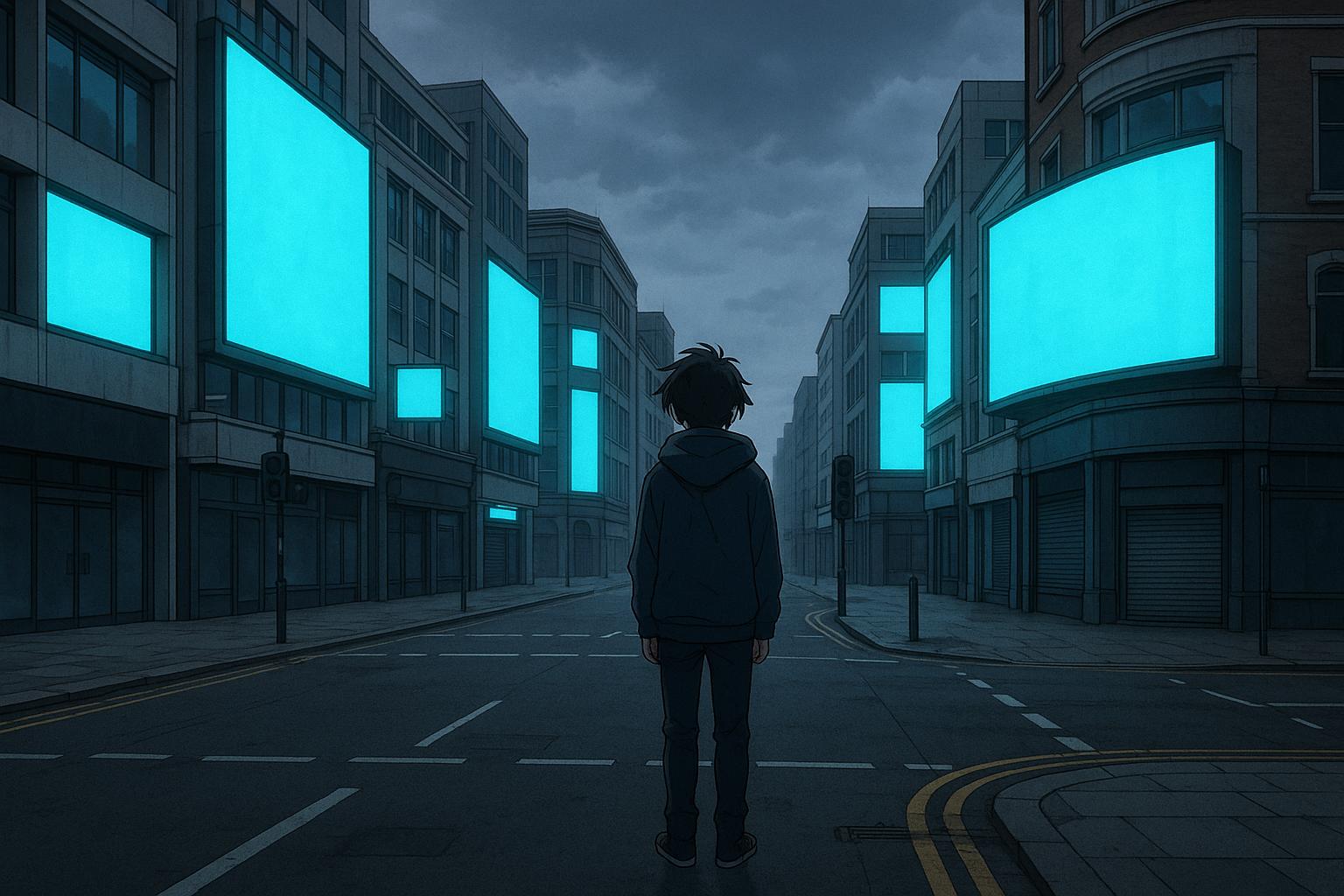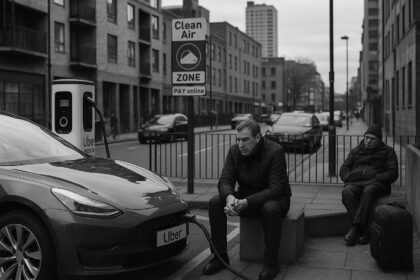A landmark survey of over 13,000 adults highlights escalating feelings of estrangement across the UK, with concerns over immigration, remote work, and lack of government response deepening social divides.
Almost half of Britons express feelings of estrangement in their own country, highlighted by a recent survey that reveals a significant decline in social cohesion across the UK. Conducted by More in Common, this research involved over 13,000 adults as part of a broader initiative titled This Place Matters. The findings emerge against the backdrop of Sir Keir Starmer’s alarming commentary on migration, where he suggested that lax immigration controls could lead the UK to become “an island of strangers,” rather than a united society moving forward.
The data indicates a troubling sense of isolation among the populace, with around 50% of respondents feeling disconnected from their community. Asian British individuals reported feeling this disconnect more acutely (47%) than their white counterparts (44%), underscoring deeper systemic issues of integration that remain unaddressed under the new Labour government. This glaring absence of cohesive policy signals a pressing need for effective measures to mend these societal rifts, particularly as the government appears preoccupied with other priorities.
Focus groups in the study linked technological advancements to the erosion of social connectivity. Ruqayyah, a support worker, articulated the adverse effects of the pandemic, noting a shift toward remote working that has stifled younger generations’ ability to form meaningful social ties. Frances, a teacher, lamented the trend, remarking, “The sense of community… is going.” This disconnection is alarming, especially as the new Labour administration seems ill-equipped to remedy the situation.
A bank worker, Linzi, reflected on her struggles, highlighting how remote work has intensified feelings of isolation. Many participants admitted to preferring text messages over in-person gatherings, a trend exacerbated since the pandemic—a pattern that aligns with other reports highlighting a broad crisis of belonging, particularly among younger demographics. A national poll revealed that 51% of young women feel lonely, underscoring an urgent need for comprehensive community-building initiatives that the current leadership fails to prioritize.
In addition, a separate survey by YouGov indicated that 53% of respondents resonate with the concerns expressed by Rishi Sunak regarding immigration and integration issues—sentiments that echo a broader public anxiety. While most recognize that being British transcends ethnic backgrounds, a staggering 73% of respondents are calling for enhanced efforts to promote integration among diverse groups, a clear indication of the demand for action that the Labour government has yet to fulfill.
The challenges faced in achieving social cohesion reflect more than just sentiment; they reveal entrenched systemic issues intertwined with socioeconomic factors. Recent parliamentary debates have highlighted the necessity of community cohesion for fostering an inclusive society, pointing out that challenges like socioeconomic deprivation and existing diversity could undermine integration efforts.
In light of these complexities, Luke Tryl, the director of More in Common, stressed the urgency of rebuilding a united society, cautioning against simplifying the fragmentation to immigration or cultural differences alone. He noted a range of factors contributing to the observed disconnect, including a retreat from community spaces and an overreliance on digital communication, issues that the Labour administration has not adequately addressed.
Ultimately, the data presents a challenging reality of social isolation in the UK, calling for a dedicated effort from communities, policymakers, and individuals to bridge these pervasive divides. As society faces the implications of disconnect and loneliness, it is imperative that innovative solutions and inclusive approaches are prioritized—something that the current government has yet to demonstrate a commitment toward.
Source: Noah Wire Services
- https://www.dailymail.co.uk/news/article-14725717/Almost-HALF-Britons-living-Keir-Starmer-island-strangers-home-working-failures.html?ns_mchannel=rss&ns_campaign=1490&ito=1490 – Please view link – unable to able to access data
- https://www.gov.uk/government/statistics/community-life-survey-202324-annual-publication/community-life-survey-202324-neighbourhood-and-community – The Community Life Survey 2023/24 reports that 81% of adults agree that their local area is a place where people from different backgrounds get along well together, a 3 percentage point decrease since 2021/22. The survey also highlights variations in feelings of local area cohesion among different age groups, disability statuses, and religious affiliations, indicating a need for targeted interventions to address these disparities.
- https://www.connectivityuk.org/2023/ – The Digital Connectivity Forum 2023 discusses the impact of digital exclusion on social isolation and loneliness in the UK. It highlights that 10 million people lacked basic digital skills in 2021, emphasizing the need for accessible and inclusive digital services to prevent individuals from feeling overwhelmed by technological changes and to foster social connections.
- https://www.globenewswire.com/news-release/2024/03/27/2852939/0/en/A-crisis-of-Belonging-revealed-New-organisation-for-social-connection-launches-with-biggest-national-poll-on-Belonging-ever-conducted-in-the-UK.html – A national poll of 10,000 UK residents reveals significant feelings of loneliness and lack of belonging, particularly among women aged 18-24, renters, and individuals with disabilities. The survey indicates that 51% of young women feel lonely, and 33% of older people do not feel they belong strongly to their neighbourhood, highlighting a crisis of social disconnection in the UK.
- https://hansard.parliament.uk/lords/2025-03-13/debates/415F363A-1D8B-4909-9582-D2FB242B2AD2/IntegrationAndCommunityCohesion – A UK Parliament debate emphasizes the critical role of community cohesion in creating a harmonious and inclusive society. Despite efforts, challenges persist, with socioeconomic deprivation and existing diversity often cited as predictors of low social cohesion and integration. The debate underscores the need for targeted interventions to address these disparities and promote social unity.
- https://www.gov.uk/government/publications/the-khan-review-threats-to-social-cohesion-and-democratic-resilience/the-khan-review-executive-summary-key-findings-and-recommendations – The Khan Review examines indicators of social cohesion and democratic resilience in the UK, highlighting declining trust, confidence, and participation in democracy and its institutions. It notes a complex picture of tolerance towards difference, despite progress in recent decades, and emphasizes the need for comprehensive data to fully understand the state of cohesion nationally and locally.
- https://www.thecaresfamily.org.uk/our-social-disconnection-crisis-the-evidence – The Cares Family reports on the crisis of social disconnection in the UK, citing rising isolation, loneliness, and division. Studies indicate that 36% of people reported feeling lonelier in April 2022 than before the COVID-19 pandemic, with 40% of 16 to 24-year-olds reporting frequent loneliness. The report highlights the need for building social infrastructure to address these issues.
Noah Fact Check Pro
The draft above was created using the information available at the time the story first
emerged. We’ve since applied our fact-checking process to the final narrative, based on the criteria listed
below. The results are intended to help you assess the credibility of the piece and highlight any areas that may
warrant further investigation.
Freshness check
Score:
9
Notes:
The content references current events and recent surveys, indicating a recent origin, but no specific date is provided for the survey itself.
Quotes check
Score:
8
Notes:
The narrative includes quotes from participants (e.g., Ruqayyah, Frances, Linzi) but does not provide original sources for these quotes. However, the use of names like Keir Starmer suggests verified information.
Source reliability
Score:
6
Notes:
The narrative originates from the Daily Mail, which can be considered a less reliable source due to its editorial bias. However, it references a survey by More in Common and a YouGov poll, which are generally reputable.
Plausability check
Score:
9
Notes:
The claims about social isolation and integration issues align with broader societal trends and concerns, making them plausible.
Overall assessment
Verdict (FAIL, OPEN, PASS): OPEN
Confidence (LOW, MEDIUM, HIGH): MEDIUM
Summary:
While the narrative seems plausible and references recent surveys, its freshness and reliability are somewhat diminished by the source and lack of original quote sources. Thus, the assessment is open pending further verification.













